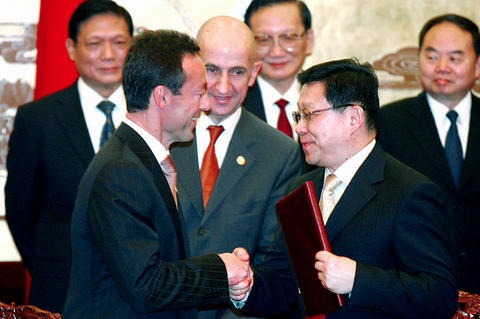China and France signed nuclear, aviation and other contracts yesterday that officials said were worth around US$30 billion, an amount French President Nicolas Sarkozy called unprecedented.
"The total amount of these contracts has never been matched before," Sarkozy told his Chinese counterpart Hu Jintao (
The contracts included an 8 billion euro (US$11.9 billion) deal for the delivery of two third-generation nuclear reactors by French firm Areva, and an agreement worth more than US$17 billion for 160 Airbus planes.

PHOTO: AFP
The total amounts of the deals -- both in industries currently undergoing speedy expansion in China -- were given by Areva CEO Anne Lauvergeon and officials involved in the Airbus talks.
The long-anticipated Areva deal will see the French company deliver two European Pressurized water Reactors (EPRs) to China Guangdong Nuclear Power Corp (CGNPC).
"It's a record. In the history of the civilian nuclear industry, there's never been a deal of this magnitude," Lauvergeon said ahead of the official signing.
Areva and CGNPC also agreed to set up a company that will operate the two EPRs until 2026, the second agreement said.
In a third deal, CGNPC will take over 35 percent in the operations of three African uranium mines which Areva gained control over this summer after acquiring Canadian uranium producer UraMin.
The Airbus purchase includes 110 planes from the short-haul A320 family and 50 A330 wide-body passenger airliners, a source said.
Ten of the 50 A330s will go to China Southern Airlines which made that part of the deal public late last month.
The deal is welcome news to Airbus, which has struggled with a decline in the US dollar and delays with its A400M military transport aircraft and the A380 superjumbo that has wiped billions of euros off its profit.
The Chinese order stands to push Airbus past Boeing in total orders for commercial aircraft.
Boeing said last week it had received 1,047 commercial airplane orders this year, already beating last year's record-setting total of 1,044 orders. Airbus had logged 1,021 commercial jet orders as of the end of last month, the most recent data available on the company's Web site.

LONG FLIGHT: The jets would be flown by US pilots, with Taiwanese copilots in the two-seat F-16D variant to help familiarize them with the aircraft, the source said The US is expected to fly 10 Lockheed Martin F-16C/D Block 70/72 jets to Taiwan over the coming months to fulfill a long-awaited order of 66 aircraft, a defense official said yesterday. Word that the first batch of the jets would be delivered soon was welcome news to Taiwan, which has become concerned about delays in the delivery of US arms amid rising military tensions with China. Speaking on condition of anonymity, the official said the initial tranche of the nation’s F-16s are rolling off assembly lines in the US and would be flown under their own power to Taiwan by way

OBJECTS AT SEA: Satellites with synthetic-aperture radar could aid in the detection of small Chinese boats attempting to illegally enter Taiwan, the space agency head said Taiwan aims to send the nation’s first low Earth orbit (LEO) satellite into space in 2027, while the first Formosat-8 and Formosat-9 spacecraft are to be launched in October and 2028 respectively, the National Science and Technology Council said yesterday. The council laid out its space development plan in a report reviewed by members of the legislature’s Education and Culture Committee. Six LEO satellites would be produced in the initial phase, with the first one, the B5G-1A, scheduled to be launched in 2027, the council said in the report. Regarding the second satellite, the B5G-1B, the government plans to work with private contractors

‘NARWHAL’: The indigenous submarine completed its harbor acceptance test recently and is now under heavy guard as it undergoes tests in open waters, a source said The Hai Kun (海鯤), the nation’s first indigenous defense submarine, yesterday began sea trials, sailing out of the Port of Kaohsiung, a military source said. Also known as the “Narwhal,” the vessel departed from CSBC Corp, Taiwan’s (台灣國際造船) shipyard at about 8am, where it had been docked. More than 10 technicians and military personnel were on deck, with several others standing atop the sail. After recently completing its harbor acceptance test, the vessel has started a series of sea-based trials, including tests of its propulsion and navigational systems, while partially surfaced, the source said. The Hai Kun underwent tests in the port from

New Taipei City prosecutors yesterday indicted nine entertainers over their alleged connection to a fraud ring that produces falsified documents to help people evade military service, including actor Darren Wang (王大陸) and show host William Liao (廖威廉). Twenty-eight people were charged with contravening the Punishment for Violation of Military Service System Act (妨害兵役治罪條例) and Article 214 of the Criminal Code for “causing a public official to make a false entry in a public document.” Prosecutors alleged the fraud ring was ran by a man, Chen Chih-ming (陳志明), and his three assistants, and that they were paid to help people dodge compulsory